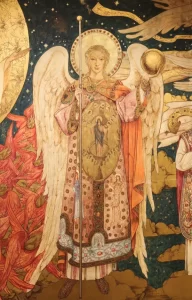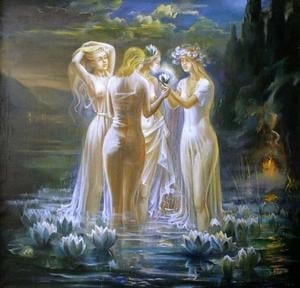From "Once upon a time - manners and worldview of the Bulgarians"
In the past
 Along with the Christian holiday of the Annunciation, which is on March 25, Bulgarians also celebrate the folklore holiday of Blagovets. It is a movable holiday because it refers to the vernal equinox, which is on a different date astronomically each year. This year, day and night are equal on March 20. The symbol of Blagovets in folk beliefs is the good news that the Earth is reborn and life continues. The church celebrates the good news that St. Archangel Gabriel informs the Mother of God - that she will have a child from the Lord and the child and will open the kingdom of heaven for all people.
Along with the Christian holiday of the Annunciation, which is on March 25, Bulgarians also celebrate the folklore holiday of Blagovets. It is a movable holiday because it refers to the vernal equinox, which is on a different date astronomically each year. This year, day and night are equal on March 20. The symbol of Blagovets in folk beliefs is the good news that the Earth is reborn and life continues. The church celebrates the good news that St. Archangel Gabriel informs the Mother of God - that she will have a child from the Lord and the child and will open the kingdom of heaven for all people.
On this day the cuckoo arrives, and with it spring. If a cuckoo hoots you, it's good to have steam in the pocket, so the year will be blessed. Most ritual songs are related to the news that the little spring bird has appeared. In the songs, the cuckoo landed sometimes in the middle of a village, sometimes in someone's yard, sometimes at the edge of the village or on the shore of a lake. The cuckoo sings only until Midsummer or St. Peter's Day, then falls silent. And the maidens try to tear off the branch on which the cuckoo is perched and carry it in their bosom, because this will bring them an early marriage.
in the pocket, so the year will be blessed. Most ritual songs are related to the news that the little spring bird has appeared. In the songs, the cuckoo landed sometimes in the middle of a village, sometimes in someone's yard, sometimes at the edge of the village or on the shore of a lake. The cuckoo sings only until Midsummer or St. Peter's Day, then falls silent. And the maidens try to tear off the branch on which the cuckoo is perched and carry it in their bosom, because this will bring them an early marriage.
On the eve of the holiday, spring cleaning of houses and yards is done. Everything old, unusable, broken, torn is thrown away to make room for the new, healthy, beautiful. Ritual fires are lit with unnecessary things - just as the unnecessary burns, so should the badness burn. Next to the pyres, the maidens sing with their ringing voices and go in groups to go around the houses and sing their ritual songs, which are sung only on Blagovets. The lyrics are aimed at the coming of the cuckoo and from there the spring, at awakening the longing of the young. Some fresh ones directly call: "Whoever has a sweet tooth, let the tooth be full". Another song tells how a young shepherd leads the flock to pasture, but is pitied because he is so far from his lib and will not receive her token of love - lilies of the valley and wreaths. Some songs are catchy and ambiguous. The maidens sneer at the bachelors, promising them an underbaked horse's head or burnt rye bread, and for themselves they ask for a roasted hen, a twice-sifted white loaf, and fresh grapes. Thus, interspersed among the banter are wishes for fertility in the new season.
 But this holiday has another meaning - mysterious and magical. The elves, who have been hibernating in a secret place at the edge of the world, are returning. They are invisible to humans, but if someone disturbs their peace and enters their territories, the Samodivas kidnap him and the person never returns to his earthly life. It is dangerous for both girls and boys. Young maidens go to springs and wells for water, and there is often a haunt of nymphs. And the shepherds, who make the forest sound with their copper cavals, often become the victim of some lone diva, who, in love with the song, makes the shepherd play to the limit and drains his strength. If he succeeds in removing the shirt of such a diva, she is left unprotected, loses her magical powers and can become his wife and bear him children. But loners are never good housekeepers. If they ever find their shirt, they grab it, grab their baby if it's a girl, and go back to their step-sisters. That's why some of the ritual songs of Blagovec are a warning, to beware of samodives. There are also strict prohibitions on this day. The boys should not pick up the plow, and the girls should not spin and weave, so as not to get sick.
But this holiday has another meaning - mysterious and magical. The elves, who have been hibernating in a secret place at the edge of the world, are returning. They are invisible to humans, but if someone disturbs their peace and enters their territories, the Samodivas kidnap him and the person never returns to his earthly life. It is dangerous for both girls and boys. Young maidens go to springs and wells for water, and there is often a haunt of nymphs. And the shepherds, who make the forest sound with their copper cavals, often become the victim of some lone diva, who, in love with the song, makes the shepherd play to the limit and drains his strength. If he succeeds in removing the shirt of such a diva, she is left unprotected, loses her magical powers and can become his wife and bear him children. But loners are never good housekeepers. If they ever find their shirt, they grab it, grab their baby if it's a girl, and go back to their step-sisters. That's why some of the ritual songs of Blagovec are a warning, to beware of samodives. There are also strict prohibitions on this day. The boys should not pick up the plow, and the girls should not spin and weave, so as not to get sick.
In ancient times, the Bulgarian worshiped the snake as the embodiment of the spirits of the ancestors. According to Blagovets, with the coming of spring, snakes and lizards wake up from their winter sleep. Since snakes are also dangerous, but it was considered a sin to kill a snake, people performed rites to drive them away. As with other holidays, the main thing here is lighting fires and tinkling with metal objects. The most frequently cast spells were: "Run snakes and lizards, because Blagovets is coming". Elsewhere, they are threatened that the storks are coming. And there are spells that drive away snakes so that "good wheat" is born. It is good to plant flowers on Blagovec, because they will grow very fragrant and beautiful.
At the table for the holiday, for the first time in the year, fresh green plants are eaten - lapad, nettle or sorrel, so that "new blood" flows into the human body. We also eat fish (roasted or boiled), pies and chives.
The holiday today in our country and around the world
Today, March 25, or Annunciation, is Mother's Day in many countries around the world. In most countries, the celebration of Mother's Day comes from the tradition of North America and Europe. Many African countries, such as former British colonies, have embraced the idea of celebrating this day, although many different cultures on the African continent have had festivals and events celebrating this holiday since before colonization.
mother's Day in Japan it was originally celebrated during the period when Emperor Akihito's mother, Empress Kojun, was born. Nowadays – as in the United States – people usually give flowers, carnations and roses as gifts on the holiday.
In China Mother's Day is gaining more and more popularity, and carnations are among the most preferred gifts and best-selling flowers. In 1997, the holiday was designated as a day to help poor mothers, specifically to remind people of the poor mothers in rural areas of western China.
In recent years, China has tried to replace the Western tradition of giving carnations with lilies, which since ancient times were planted by Chinese mothers when their children left home.
mother's Day in Greece corresponds to the Eastern Orthodox feast of the Meeting of the Lord. Since the Virgin Mary (Mother of God) appears prominently in this holiday as the one going to the Jerusalem Temple, this holiday has been associated with mothers.
Most historians believe that in the past young apprentices and enslaved women were released by their masters to visit their families on this day. Nowadays, this holiday honors and honors the mother. Mother's Day is celebrated at the earliest on March 1st (when Easter is on March 22nd) and at the latest on April 4th (when Easter is on April 25th).
In North America Mother's Day is celebrated on the second Sunday of May. In the United States, Mother's Day was intended as a rallying cry for women against war.
In our country we also honor our mothers on March 8, when it is International Women's Day. The two holidays are different, carry different symbolism and meaning. March 8 is a day for international recognition of women's rights and their achievements - economic, political and social. While March 25 is the day of the woman who became a mother and gave a new life.
© 2023 Iliana Dechkova

